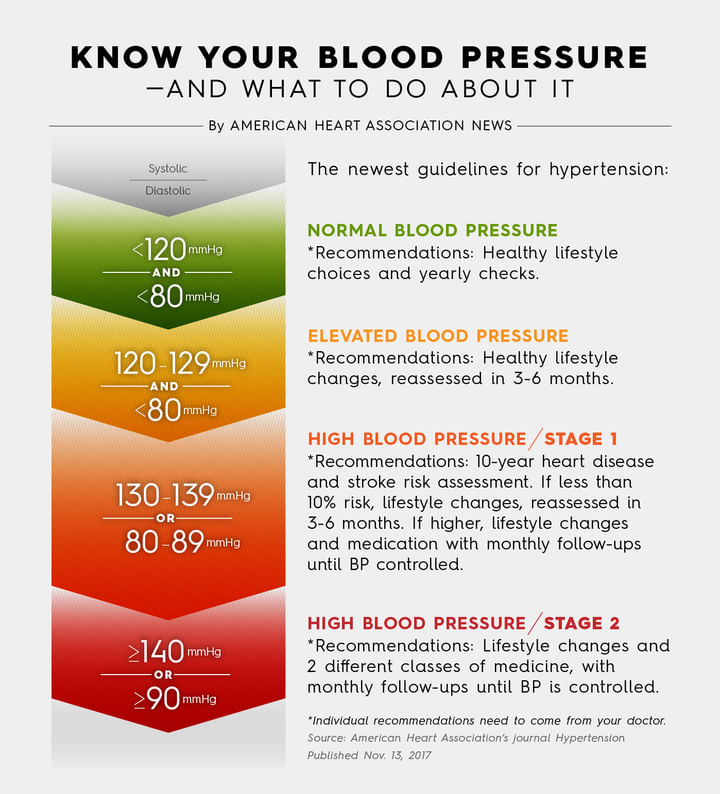High Blood Pressure - Its Myths And Facts!
High Blood Pressure
High blood pressure is also called as hypertension. Blood pressure is the total force that is exerted against the arteries walls as the blood flows through the arteries. If you have a high blood pressure problem then you should visit a doctor. High blood pressure can lead to various health complications if left uncontrolled or untreated. These health problems include loss of the vision, kidney disease, stroke and heart problem. It is a common problem. But it is important to diagnose it early so that treatment can be provided on time. You should check your blood pressure regularly as it would help you and your doctor to find the changes if any. Hypertension can be treated with the help of prescribed medicines or by making some changes in the lifestyle related to health.
Symptoms of High Blood Pressure
It is not necessary that people will experience symptoms in case of high blood pressure. Many people do not experience the symptoms. That is why it is generally known as a silent condition. When blood pressure reaches around 180/110 mmHg then it becomes a medical emergency called a hypertensive crisis. You will experience the symptoms at this stage. Check out various symptoms of high blood pressure that you may experience:
- High blood pressure may lead to nosebleeds.
- A headache, breathlessness, nausea, vomiting, and dizziness are some of the symptoms that you may experience due to a hypertensive crisis.
- Blurred or double vision is one of the symptoms or signs of high blood pressure.
- A condition of hypertensive crisis may lead to palpitations or forceful or irregular heartbeats.
- Children with high blood pressure may experience various symptoms including blurred vision, headache, nosebleeds, fatigue or Bell's palsy in which it becomes hard to control the muscles on one side of the face.
- Very young babies and newborns can also have high blood pressure. They experience various signs including respiratory distress, irritability, seizure, lethargy, and failure to thrive.
Causes of High Blood Pressure
A person has high blood pressure when the arteries walls receive a lot of pressure on a constant basis. High blood pressure causes are categorised in two categories including essential high blood pressure and secondary high blood pressure. Essential high blood pressure has no cause while secondary high blood pressure has an underlying cause. As per some evidence, there are some factors that can be responsible for essential high blood pressure. Check out some of the causes of essential high blood pressure and secondary high blood pressure:
- The more your age is the higher the risk of developing high blood pressure.
- If you have someone in your family who has the problem of hypertension then you are at a greater risk of developing high blood pressure.
- Both obese and overweight people are prone to develop hypertension or high blood pressure in comparison to other people who have a normal weight.
- Adult men are more prone to high blood pressure than adult women. Though, after the age of 60 years, both women and men are equally prone to develop high blood pressure.
- Lack of physical exercises may lead to hypertension or high blood pressure.
- Due to smoking, the blood vessels can become narrow leading to high blood pressure. Smoking also minimises the content of oxygen in the blood due to which the heart has to pump the blood faster to compensate, leading to high blood pressure.
- People who consume alcohol regularly are at more risk of developing high blood pressure than other people who do not consume alcohol.
- High salt intake increases the chances of developing hypertension or high blood pressure.
- Having a high-fat diet may lead to an increase in blood pressure.
- If a person has some stress from a long-term then it can create a serious impact on blood pressure.
- People with diabetes have greater chances of developing high blood pressure.
- As per some research, it has been noticed that if you have psoriasis then you are at a risk of developing diabetes and high blood pressure.
- Pregnant women are at risk of developing high blood pressure or hypertension than women who are not pregnant and are of the same age.
How is it diagnosed?
High blood pressure or hypertension can be easily diagnosed by taking a reading of blood pressure. Generally, most of the doctors check your blood pressure during your routine visit. You should get your blood pressure checked regularly, especially whenever you visit a doctor. If your doctor finds that you have high blood pressure then your doctor will ask you to take more readings regularly over the course of some days or weeks. It is not possible to give high blood pressure diagnosis just after one reading. That is why your doctor wants to check your blood pressure over the course of some more days. The level of blood pressure changes throughout the day. Sometimes blood pressure elevates due to stress that you may have during your examinations. So, your doctor wants more readings in order to confirm the diagnosis. If your doctor notices that your blood pressure remains elevated then your doctor may ask you to get more tests done to find out underlying conditions. These tests include:
- Urine test
- Screening for cholesterol
- Other blood tests
- Electrocardiogram (EKG or ECG) test for recording the electrical activity of your heart
- Ultrasound of your kidneys or heart
Doctors ask you to get these tests done in order to know about the secondary issues leading to high blood pressure. Tests will also help to find out the effects that elevated blood pressure may have had on the organs of an affected person.
Prevention
Check out various ways that may reduce the chances of developing high blood pressure or hypertension:
- You should add healthy food items to your diet. You should eat a lot of vegetables and fruits every day. Your goal should be to add 10 servings of vegetables and fruits in a day.
- You should avoid foods which have high-sugar such as flavoured yoghurts, sodas, and cereals.
- You should monitor your blood pressure regularly as it helps to avoid various complications associated with hypertension.
- You should set goals in order to lose the weight. It will be more beneficial for you if you would be specific about your goals.
- You should reduce the intake of salt or sodium.
- Excessive drinking can lead to elevated blood pressure so you should reduce or avoid the consumption of alcohol.
- You should not drink plenty of those beverages which contain caffeine.
Treatment of High Blood Pressure
The treatment that is provided by your doctor depends on many factors including its severity, type of hypertension, causes of hypertension, chances of developing cardiovascular disease or stroke. Your doctor provides you with the best treatment as per your condition.
- Primary treatment options for hypertension: If your doctor finds out that you have a problem of primary hypertension then should make some changes in your lifestyle as it would help you to reduce your elevated blood pressure. If lifestyle changes only do not work for you then your doctor may prescribe you some medicines.
- Secondary treatment options for hypertension: If your doctor finds out the underlying cause of elevated blood pressure then your doctor would focus on treating that particular condition. If there is some medicine that is the cause of high blood pressure then your doctor will recommend you some other medicine with no side effects. There is a possibility that hypertension continues even after treating the underlying cause. In such case, your doctor would suggest you some lifestyle changes and prescribe medicines to reduce the elevated blood pressure. Your doctor continuously works with you to evolve your treatment plan as it is not necessary that what worked earlier will work now.
Complications
If the hypertension is not treated at the right time the excessive pressure on the artery walls can lead to damage of the blood vessels as well as some other vital organs. The factors on which the extent of damage depends are the severity of hypertension and for how long it has not been treated. Check out various complications associated with high blood pressure:
- heart attack and heart failure
- the problem in brain functioning and memory functioning
- thickened, narrow, or torn blood vessels in the eyes
- blood clots
- kidney disease
- metabolic syndrome
- aneurysm
- stroke
Myths
Check out some of the common myths about high blood pressure:
Myth #1. There are people in my family with high blood pressure so I cannot do anything to prevent it.
It is a fact that if someone in your family has the problem of high blood pressure then you are more prone to develop hypertension or high blood pressure. But it is wrong to say that you cannot prevent high blood pressure if it runs in your family. Lifestyles changes help people to avoid high blood pressure even if it runs in their family.
Myth #2. I am a patient of high blood pressure and my doctor checks my blood pressure whenever I visit him so I need not check it at home.
Blood pressure keeps on fluctuating. If you record and monitor the blood pressure at home then you will able to provide important details to your doctor. This will help your doctor to decide whether the treatment plan is working or not. It is important that you take blood pressure readings daily, every morning and evening, or as per your doctor suggestion.
Conclusion
High blood pressure or hypertension is a common problem. People generally ignore high blood pressure in its earlier stage but this should be avoided. High blood pressure can lead to severe health complications if left untreated for a long time. The common symptoms of high blood pressure are nosebleeds, vomiting, nausea, dizziness, and more. A high-fat diet, high salt intake, smoking, and lack of physical exercises are some of the possible causes of high blood pressure. Your doctor can easily find out that you have high blood pressure by taking a reading. If your doctor finds out that you have elevated blood pressure then he or she may ask you to get more readings. Once your doctor notices that the readings are continuously high then your doctor will ask you to get some tests done including urine test, blood tests, electrocardiogram test, ultrasound of kidneys and heart, and more in order to be confirmed about the diagnosis. A lot of complications are associated with high blood pressure including stroke, kidney disease, heart failure and blood clots. People have many myths or misconceptions about high blood pressure. If someone in your family has high blood pressure then you cannot do anything to prevent it is one of the common myths.



+1.svg)
